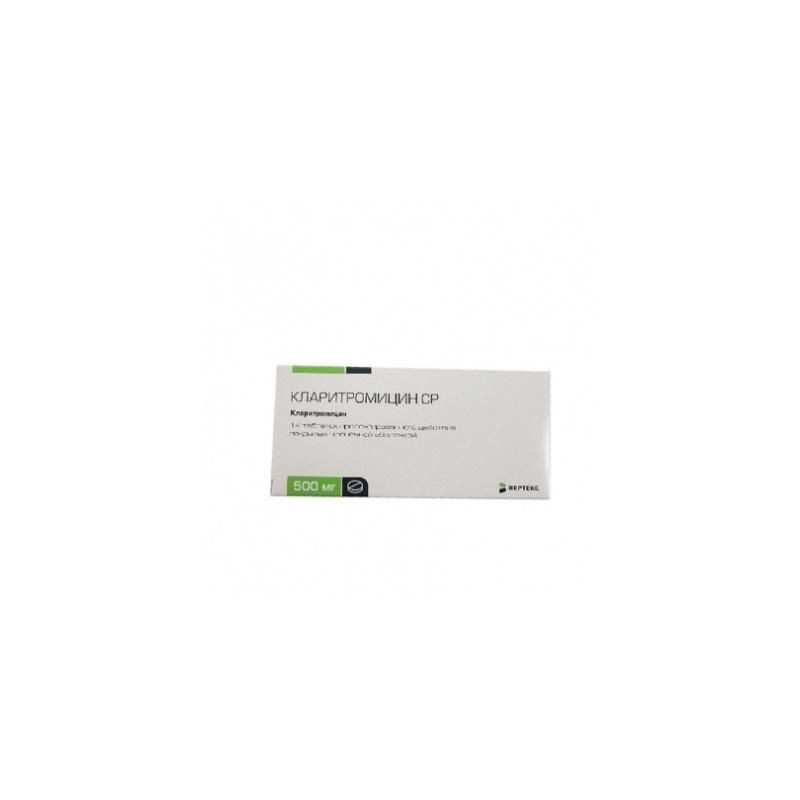



 All payments are encrypted via SSL
All payments are encrypted via SSL
 Full Refund if you haven't received your order
Full Refund if you haven't received your order
Antibiotic from the group of macrolides with a slow release. The mechanism of action is to suppress protein synthesis in the microbial cell by interacting with the ribosomal 50S-subunit of bacteria. The minimum inhibitory concentration (MIC) of clarithromycin is 2 times lower than that of Erythromycin. The metabolite of clarithromycin 14-hydroxylarithromycin, has antimicrobial activity. Clarithromycin has a broad spectrum of antimicrobial action.
A drug active against gram-positive microorganisms: Staphylococcus aureus, Streptococcus pneumoniae, Streptococcus pyogenes, alpha-hemolytic streptococci, Listeria monocytogenes; Gram-negative microorganisms: Haemophilus influenzae, Haemophilus parainfluenzae, Helicobacter pylori, Moraxella (Branhamella) catarrhalis, Neisseria gonorrhoeae, Legionella pneumophila, Bordetella pertussis; intracellular microorganisms: Mycoplasma pneumoniae, Ureaplasma urealyticum, Chlamydia trachomatis, Chlamydia pneumoniae, Mycobacterium avium, Mycobacterium leprae, Mycobacterium kansasii, Mycobacterium chelonae, Mycobacterium fortuitum, Mycobacterium intracellurareumareum anaerobic microorganisms: Clostridium perfringens, Peptococcus species, Peptostreptococcus species, Propionibacterium acnes, Bacteroides melaninogenicus; other microorganisms: Borrelia burgdorferi, Treponema pallidum.
Suction
After taking the drug inside Tmax in blood plasma is about 6 hours. The bioavailability of clarithromycin is 50%. Concentration in blood plasma with regular intake of clarithromycin in a dose of 500 mg is 1.3 mcg / ml, and its main metabolite, 14-hydroxycarythromycin, is 0.48 mcg / ml.
Removal
T1/2 clarithromycin and its metabolite are 5.3 and 7.7 h, respectively. Excretion is carried out in the form of metabolites with urine (40%) and with feces (30%).
Pharmacokinetics in special clinical situations
Elderly patients have higher concentrations of clarithromycin and 14-hydroxycarythromycin, and excretion is slower.
Indications for use
Infectious and inflammatory diseases caused by microorganisms sensitive to the drug:
- respiratory tract infections (sinusitis, pharyngitis, bronchitis, pneumonia);
- infections of the skin and soft tissues (folliculitis, erysipelas);
- Helicobacter pylori-associated diseases of the stomach and duodenum.
Clarithromycin SR-ratiofarm prescribed inside adults and children over 18 years old at a dose of 500 mg (1 tab.) with meals. If necessary, you can increase the dose up to 1 g (2 tab.) At the reception or in 2 doses with an interval of 12 hours. The average daily dose is 500 mg. The maximum daily dose - 1 g.
The duration of treatment is usually 7-14 days.
Often: headache, dizziness, anxiety, fear; nausea, vomiting, abdominal pain, diarrhea.
Sometimes: candidal stomatitis, glossitis, discoloration of the tongue and teeth; arthralgia, myalgia; skin rash, urticaria; paresthesia, taste perversion, visual disturbances; increased activity of hepatic transaminases, creatinine content in plasma.
Seldom: insomnia, tinnitus, uveitis; disorientation, hallucinations, psychosis, depersonalization,confusion; tachycardia, ventricular arrhythmia; pseudomembranous enterocolitis, hepatitis, cholestatic jaundice, pancreatitis; interstitial nephritis, renal failure; hypoglycemia, leukopenia, thrombocytopenia; Stevens-Johnson syndrome (malignant exudative erythema) and toxic epidermal necrolysis.
In isolated cases: hearing loss passing after discontinuation of the drug.
- porphyria;
- renal failure (CC less than 30 ml / min);
- simultaneous administration of cisapride, pimozide and terfenadine, astemizole, ergotamine and other ergot alkaloids;
- fructose intolerance, impaired glucose-galactose digestion, or sucrase-isomaltase deficiency;
- I trimester of pregnancy;
- lactation period (breastfeeding);
- children's age up to 18 years;
- hypersensitivity to the drug;
- Hypersensitivity to macrolide antibiotics.
Use in the first trimester of pregnancy and during lactation (breastfeeding) is contraindicated.
Caution is needed when using Clarithromycin SR-ratiopharm in patients with impaired liver function.
Contraindicated: renal failure (CC less than 30 ml / min).
Care must be taken when using Clarithromycin SR-ratiopharm in patients with impaired renal function.
Contraindicated: children under 18 years.
Caution is needed when using Clarithromycin SR-ratiopharm in patients with impaired liver and kidney function.
In the case of co-administration with Warfarin or other anticoagulants, it is necessary to control the prothrombin time.
Influence on ability to drive motor transport and control mechanisms
Does not affect.
Symptoms: nausea, vomiting, abdominal pain, diarrhea, headache, confusion.
Treatment: gastric lavage, symptomatic therapy
With simultaneous use with the drug Clarithromycin SR-ratiofarm:
- Drugs and Medicines plasma;
- theophylline, Digoxin, Carbamazepine, colchicine - it is possible to increase their concentrations in plasma;
-varfarina - may increase the effect of warfarin (control of prothrombin time is necessary);
- quinidine or disopyramide - ventricular tachycardia is possible;
- ergotamine or dihydroergotamine - enhancing their effects with the development of vasospasm;
- ritonavir - it is possible to increase the concentration of clarithromycin (with this combination, the dose of Clarithromycin SR-ratiopharm should be no more than 500 mg / day);
- tsizaprid, pimozide - may increase the QT interval, arrhythmia, ventricular tachycardia, fibrillation, flutter, ventricular fibrillation;
-when simultaneous oral administration of clarithromycin and zidovudine in HIV-infected patients, there was a decrease in the concentration of zidovudine in the blood plasma, since clarithromycin affects the absorption of zidovudine (the interval between doses of these drugs should be at least 4 hours).
Cross-resistance between clarithromycin, Lincomycin and Clindamycin may develop.
Pharmacy sales terms
Terms and conditions of storage
The drug should be stored out of the reach of children, protected from light at a temperature not higher than 25 ° C.
